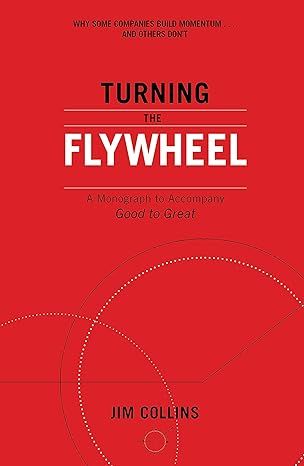Turning the Flywheel: A Monograph to Accompany Good to Great
4.6 out of 5
1,230 global ratings
A companion guidebook to the number-one bestselling Good to Great, focused on implementation of the flywheel concept, one of Jim Collins’ most memorable ideas that has been used across industries and the social sectors, and with startups.
The key to business success is not a single innovation or one plan. It is the act of turning the flywheel, slowly gaining momentum and eventually reaching a breakthrough. Building upon the flywheel concept introduced in his groundbreaking classic Good to Great, Jim Collins teaches readers how to create their own flywheel, how to accelerate the flywheel’s momentum, and how to stay on the flywheel in shifting markets and during times of turbulence.
Combining research from his Good to Great labs and case studies from organizations like Amazon, Vanguard, and the Cleveland Clinic which have turned their flywheels with outstanding results, Collins demonstrates that successful organizations can disrupt the world around them—and reach unprecedented success—by employing the flywheel concept.
48 pages,
Kindle
Audiobook
Paperback
Audio CD
First published February 27, 2019
ISBN 9781847942555
About the authors
Jim Collins
Jim Collins is a student and teacher of what makes great companies tick, and a Socratic advisor to leaders in the business and social sectors. Having invested more than a quarter century in rigorous research, he has authored or coauthored a series of books that have sold in total more than 10 million copies worldwide. They include Good to Great, the #1 bestseller, which examines why some companies make the leap and others don’t; the enduring classic Built to Last, which discovers why some companies remain visionary for generations; How the Mighty Fall, which delves into how once-great companies can self-destruct; and Great by Choice, which uncovers the leadership behaviors for thriving in chaos and uncertainty. Jim has also published two monographs that extend the ideas in his primary books: Good to Great and the Social Sectors and Turning the Flywheel.
His most recent publication is BE 2.0 (Beyond Entrepreneurship 2.0), an ambitious upgrade of his very first book; it returns Jim to his original focus on small, entrepreneurial companies and honors his coauthor and mentor Bill Lazier.
Driven by a relentless curiosity, Jim began his research and teaching career on the faculty at the Stanford Graduate School of Business, where he received the Distinguished Teaching Award in 1992. In 1995, he founded a management laboratory in Boulder, Colorado, where he conducts research and engages with CEOs and senior-leadership teams.
In addition to his work in the business sector, Jim has a passion for learning and teaching in the social sectors, including education, healthcare, government, faith-based organizations, social ventures, and cause-driven nonprofits. In 2012 and 2013, he had the honor to serve a two-year appointment as the Class of 1951 Chair for the Study of Leadership at the United States Military Academy at West Point.
Jim holds a bachelor's degree in mathematical sciences and an MBA from Stanford University, and honorary doctoral degrees from the University of Colorado and the Peter F. Drucker Graduate School of Management at Claremont Graduate University. In 2017, Forbes selected Jim as one of the 100 Greatest Living Business Minds.
Read more
Reviews
JamesLansberry
5
great expansion on a Good to Great concept
Reviewed in the United States on January 27, 2023
Verified Purchase
The Flywheel concept from GTG was one of the less clear ideas in the book QS expressed. More than a decade after reading GTG I was shown this monograph and it was well worth the price and the quick read.
Anonymous
5
A crisp refinement of the ideas in Good to Great
Reviewed in the United States on June 26, 2019
Verified Purchase
It’s compelling to read such a monograph, which reinforces the ideas from Good to Great (especially, as well as his other works), sharpening those points that were understated originally, and have proven to be especially relevant. Expensive per page, but also dense value per page.
Kindle Customer
5
FLYWHEEL
Reviewed in the United States on May 12, 2021
Verified Purchase
Easy read, It diddnt give me as much info as I thought it would, but I liked how he talked about his other book thats suppose to be good to grate so much, the info I mostly got from this book is I need to learn how to push the fly wheel in the right directions knowing when to spin off and go in another direction. or just learning to add on to my great work, I don't recommend this book I recommend good to grate peace.
Read more
2 people found this helpful
AAP
5
A must read for all startup founders!
Reviewed in the United States on January 1, 2021
Verified Purchase
It is a short easy read and I have read this monograph multiple times over the years. Always enjoy reading it and find some useful nuggets each time. Have also gifted it to a few startup founders who have found it helpful.
John W. Pearson
5
2019 Wisdom From Jim Collins in Just 29 Pages!
Reviewed in the United States on March 18, 2019
Verified Purchase
In his 2019 hot-off-the-press mini-book, Jim Collins reminds us: • “When you have disciplined people, you don’t need hierarchy. • When you have disciplined thought, you don’t need bureaucracy. • When you have disciplined action, you don’t need excessive controls. • When you combine a culture of discipline with an ethic of entrepreneurship, you create a powerful mixture that correlates with great performance.”
“Turning the Flywheel” is the latest gem from over 25 years of research from Jim Collins (just 29 pages plus eight pages of helpful summaries in the appendix). The subtitle describes this must-read content: “Why Some Companies Build Momentum and Others Don’t.”
So think about this: You’ve written five powerful business books between 1994 and 2011 (plus a lesser known book in 1992). You’ve sold over 10 million copies worldwide. The assignment in 2019: boil it all down and deliver the key thought—the Big Idea—of what leaders and managers are missing. Pick from this list: • Level 5 Leadership • Genius of the And • Confront the Brutal Facts • The Hedgehog Concept • The Flywheel • 20 Mile March • Fire Bullets, Then Cannonballs • Productive Paranoia • Clock Building, Not Time Telling • Preserve the Core/Stimulate Progress • Return on Luck • Superior Results • Distinctive Impact • Lasting Endurance
What one concept would you pick—that rises above everything else—and is your critical message for organizations today? Jim Collins picked the flywheel.
I’ve reviewed Collins’ books over the years and found leadership wisdom in every one—but even if you’re already a Jim Collins zealot—“Turning the Flywheel” will re-energize you. Here’s why: “No matter what your walk of life, no matter how big or small your enterprise, no matter whether it’s for-profit or nonprofit, no matter whether you’re CEO or a unit leader, the question stands, How does your flywheel turn?”
What’s a flywheel? Read Chapter 8 of “Good to Great,” “The Flywheel and the Doom Loop,” or read the nine-line summary in the appendix of “Turning the Flywheel,” including this: “…the process resembles relentlessly pushing a giant, heavy flywheel, turn upon turn, building momentum until a point of breakthrough, and beyond.” (By the way, Collins includes more than a dozen succinct summaries of his amazing body of work in just eight pages. Perfect snippets for your next 14 weekly staff meetings!)
THE BIG IDEA: “To maximize the flywheel you need to understand how your specific flywheel turns.”
Collins illustrates the uniqueness of the flywheel approach with flywheel diagrams from seven companies and nonprofits, including Ware Elementary School, located on the Fort Riley army base in Kansas. Deb Gustafson, the principal, first read the “Good to Great and the Social Sectors” monograph and was absolutely giddy! “When I got to the part about turning the flywheel, I was bouncing up and down out of my seat,” she said.
And note this: Jeff Bezos “…considered Amazon’s application of the flywheel concept ‘the secret sauce.’” But this caution: you need to understand how your organization’s specific flywheel turns—and the sequence of the components. Collins notes seven key steps for capturing your unique flywheel approach—plus this warning: don’t feature more than four to six components.
He includes flywheel diagrams from Amazon, Vanguard, Intel, Giro, Ware Elementary School, Ojai Music Festival, and the Cleveland Clinic. (Wow—Collins must have a love affair with Cleveland. In his first monograph, he highlights “Greatness at the Cleveland Orchestra”—one of my favorite examples for nonprofits.)
He packs all of this—and more—into just 29 pages, plus the appendix. But this is all you’re getting in this review, otherwise you wouldn’t need to buy the book. But I’ll close with this motivational pop quiz:
STAFF MEETING POP QUIZ:
- If you’re a millennial and you’ve read a book by Jim Collins, please stand. I have a Starbucks card for you.
- What books/insights by Jim Collins have made the greatest impact on our department or organization?
- If you have a marked-up/heavily-read copy of any book by Jim Collins, please stand: I have a Starbucks card for you.
- If you have NOT read a book by Jim Collins, but would volunteer to read and review “Turning the Flywheel” at our next staff meeting, please stand. I have a Chick-fil-A gift card for you!
- True or False? Using the flywheel concept at Ware Elementary School, the principal and her team saw satisfactory reading levels of just 35% mushroom to 99% in just seven years. (Answer: True!)
Collins concludes on page 37 in the appendix: “Finally, I caution against ever believing that your organization has achieved ultimate greatness. Good to great is never done.”
Read more
40 people found this helpful
V. S. Cusack
5
Excellent Refresher!
Reviewed in the United States on July 27, 2020
Verified Purchase
A must read for all those in leadership. This monograph outlines the practices to follow in order to define and refine your companies flywheel. I’ve even using these principals for years within my company as well as those I have worked with.
Naomi B.
5
Good to Great cliffnotes
Reviewed in the United States on November 8, 2023
Verified Purchase
Need a Good to Great cliff note version versus rereading the entire book? This is it!
Tadashi
5
Libro corto, pero profundo
Reviewed in the United States on June 26, 2024
Verified Purchase
Me encantó el modelo que propone. Hace sentido y ayuda mucho a la mirada estratégica. Un buen libro para leer en breve. En menos de 1 hora ya está
Zackary D. Barron
4
good but a little vague
Reviewed in the United States on February 14, 2023
Verified Purchase
I generally liked the book and I did get a good feel the message it was conveying. But at the same time, there were a lot of bromides in here instead of truly concrete actions!
Kindle Customer
3
Unlike Collins other books, this is not a must-read
Reviewed in the United States on November 18, 2023
Verified Purchase
A nice elaboration on the idea of the flywheel presented in his other books but not really adding much value. A big party of this short book is just a summary of other concepts described in length in his longer books.
Top Jim Collins titles
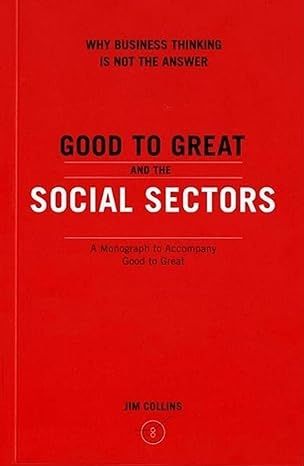
Good to Great and the Social Sectors: A Monograph to Accompany Good to Great (Good to Great, 3)
4.5
-
1,474
$6.00
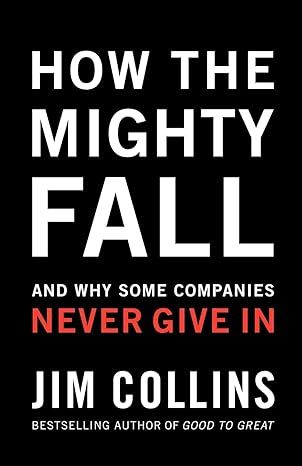
How The Mighty Fall
4.6
-
1,081
$0.99
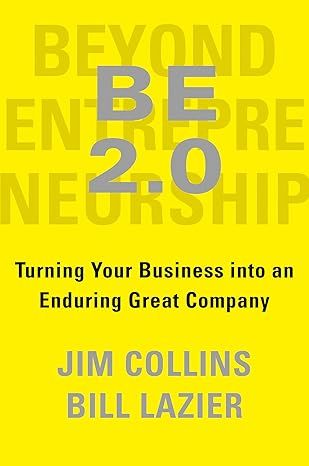
BE 2.0 (Beyond Entrepreneurship 2.0): Turning Your Business into an Enduring Great Company
4.8
-
803
$0.99
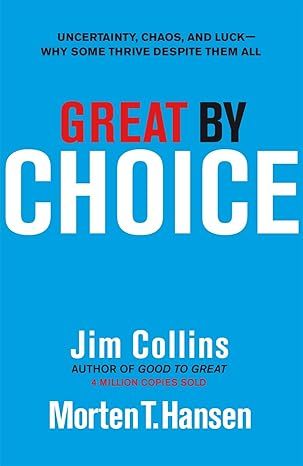
Great by Choice: Uncertainty, Chaos and Luck - Why Some Thrive Despite Them All
4.6
-
1,765
$0.99
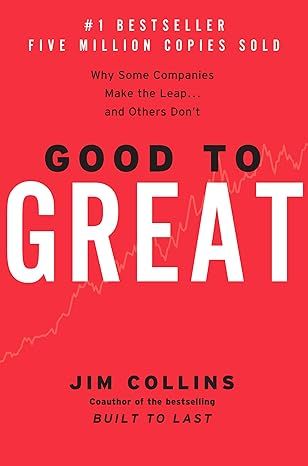
Good to Great: Why Some Companies Make the Leap...And Others Don't (Good to Great, 1)
4.5
-
9,099
$0.99
Best Sellers

The Tuscan Child
4.2
-
100,022
$8.39

The Thursday Murder Club: A Novel (A Thursday Murder Club Mystery)
4.3
-
155,575
$6.33

Sapiens: A Brief History of Humankind
4.6
-
140,302
$13.49

The Butterfly Garden (The Collector, 1)
4.3
-
88,556
$9.59

Things We Hide from the Light (Knockemout Series, 2)
4.4
-
94,890
$11.66

The Last Thing He Told Me: A Novel
4.3
-
154,085
$2.99

The Perfect Marriage: A Completely Gripping Psychological Suspense
4.3
-
143,196
$9.47

The Coworker
4.1
-
80,003
$13.48

First Lie Wins: A Novel (Random House Large Print)
4.3
-
54,062
$14.99

Mile High (Windy City Series Book 1)
4.4
-
59,745
$16.19

Layla
4.2
-
107,613
$8.99

The Locked Door
4.4
-
94,673
$8.53
